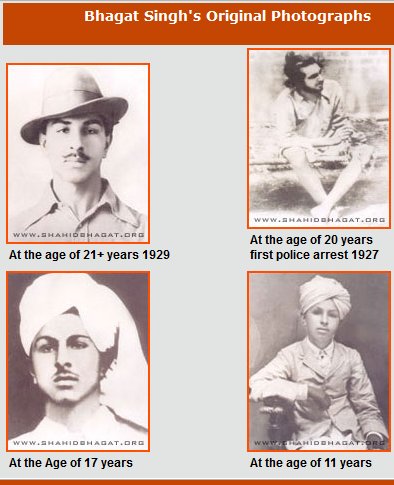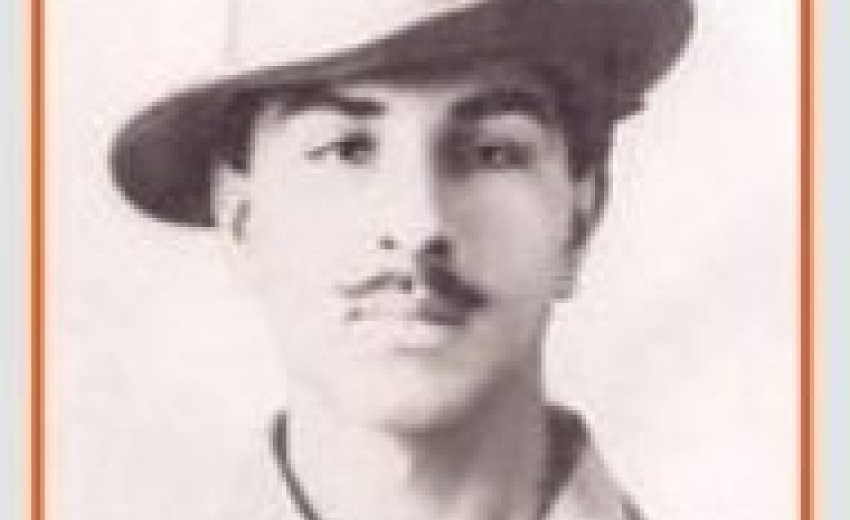Here was an immensely talented, charismatic and scholarly young man who epitomised the best values of secularism and rationality, led by example, put his nation, team and people before himself, practised a rigorous disciplined work ethic, willingly embraced self-denial and represented the common people of India. Aren't these the virtues that modern India is desperately looking for in an elusive new leader? A tribute to the martyr whose 104th birth anniversary (born on September 28, 1907) was celebrated.

A question often and unfairly asked is: Why does Shaheed Bhagat Singh have such national and international appeal when many of his contemporaries and fellow revolutionaries, who also sacrificed their lives, do not get the same public adulation?
Personally, I believe that the question is overly simplistic and very disingenuous. But it does make one reflect over the phenomenon of Shaheed Bhagat Singh. Nowhere else in the world has someone achieved such fame, following and veneration in such a short life.
All of 23, when he embraced martyrdom, his death was the tipping point of the Indian freedom struggle. His sacrifice revitalised the freedom movement, which was going astray due to various factors, and rekindled the national consciousness, which in the early 1930s, was severely in danger of being tarnished by communalism, regionalism and other ideological dissensions unleashed by the British.
That his sacrifice continues to be a source of inspiration 80 years after his death testifies that many of the evils he fought continue to afflict the country.
So what is it about him that makes him popular, inspirational and venerable across nations, religions, societies, time eras and age groups?
Certainly, the sheer nobility and selflessness of his martyrdom moved people. But, I believe, that there is much more about him that explains the power of his following. A careful assessment of history shows that he is the first Indian freedom fighter who was extremely young (the youngest of all) but at the same time, intellectually sophisticated, extremely well read, eloquent, articulate and someone who epitomised meritocracy.
Till his arrival the Indian freedom struggle was dominated by people born in privileged families, who had had privileged European education, sufficient international exposure and had the good fortune of being groomed under a highly eminent senior national leader.
Gokhale, for instance, mentored Gandhiji, who in turn took Pandit Nehru under his tutelage. The longevity of this experience also meant that these leaders were considerably older. For instance, Pandit Nehru, who was projected by the Congress as the leader of the youth, was way past his 40s in 1931.
On the contrary, Shaheed Bhagat Singh was born in a farmer's family. Reasonably well off, his parents were nowhere as rich as that of spearheads of the national movement that time. He had no means to get fancy education but turned himself into an intellectual stalwart through his voracious readings and active thinking.
It is said that when he was to be taken to the gallows, he asked the jailor to let him complete the chapter of the book that he was reading. In his own words, "Study was a cry that always reverberated in the corridors of my mind."
Hardly into his early 20s, he had read the works of Marx, Lenin, Tom Paine, Victor Hugo, Dostoevsky, Sinclair, John Mill, Nikolay Bukharin, and Thomas Aquinas, amongst others.
It is a testament to his intelligence that his work - "Why I Am an Atheist?" -- despite the brevity of the document, is regarded in the same league as some of the finest literary works of Indian leaders such as Pt. Nehru and Dr Ambedkar.
While in prison, he wrote a book called "The Ideal of Socialism". Its manuscript was smuggled out of the prison, but inexplicably and tragically it was lost.
Secondly, Shaheed Bhagat Singh was one of the first leaders to openly disassociate himself from religion. This means he was the first and probably the only influential leader in the Indian freedom struggle to have espoused secularism in a manner that was subsequently defined by the Constitution of independent India (that the state has no religion).
This stance of his got him a lot of respect from common people who were being torn apart by Hindu, Muslim and Sikh fundamentalist groups.
I quote an excerpt from his writing, wherein he says, " I would attribute the origin of God to the ingenuity of exploiters who wanted to keep the people under their subjection by preaching the existence of a Supreme Being and then claiming an authority and sanction from him for their privileged positions". He further states that "emancipation from bondage of religion and superstition" is highly crucial.
Thirdly, Shaheed Bhagat Singh was the first leader, who cut a unanimous appeal with Indian youth, most of whom were from under- or non-privileged backgrounds. As I mentioned earlier, the Indian freedom struggle was thus far being largely led by genteel uber sophisticated senior politicians who had noble ideas, but for ordinary people they were "brown sahibs".
The common youngster could not identify himself with them. By launching student mobilisation movements, organising community kitchens and dialogue and launching initiatives such as the Naujawan Bharat Sabha, Shaheed Bhagat Singh gave a feeling to youngsters from lower middle class and poor families that they too could contribute to the national struggle without being held hostage to their caste, class or religion.
The fourth, of course, is the sacrifice. By this I do not merely mean his gallant embrace of the gallows but his entire life. His forsaking of what could have been a comfortable life, his start of a mammoth fasting session to protest against inhuman conditions of Indian prisoners, his decision to choose himself to drop a bomb in the assembly and the sheer selflessness with which he led his life are instances that are without a parallel in world history.
I feel a gut-wrenching pain when idiotic people try and draw parallels between him and Che Guevara. My earnest request to them is not to sully Shaheed Bhagat Singh's reputation. Charismatic he was, but Guevara cannot escape the blame for fomenting some needless wars and persecution of innocent people in Castro's Cuba. On the contrary, Bhagat Singh's legacy is without a blemish. He was and continues to be a hero without reproach.
Here was an immensely talented, charismatic and scholarly young man who epitomised the best values of secularism and rationality, led by example, put his nation, team and people before himself, practised a rigorous disciplined work ethic, willingly embraced self-denial and represented the common man of India. Aren't these the virtues that modern India is desperately looking for in an elusive new leader? That should explain his continuous appeal and answer the question at the start of this write-up.
The writer is a former Finance Minister of Punjab and the leader of the People's Party of Punjab
